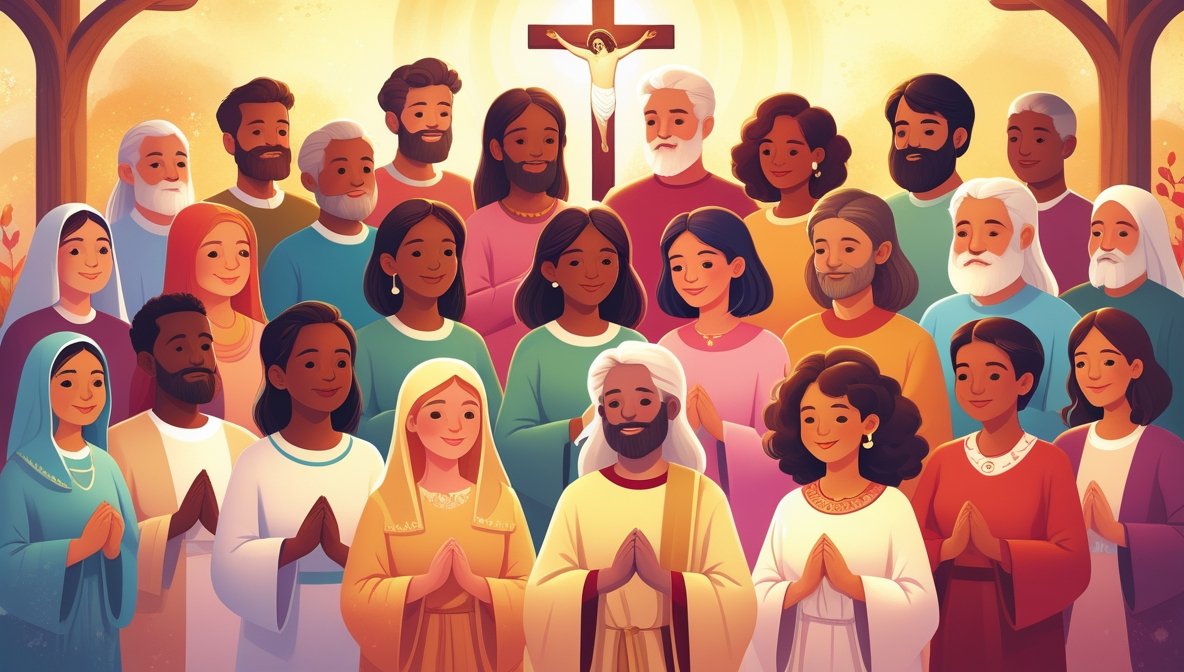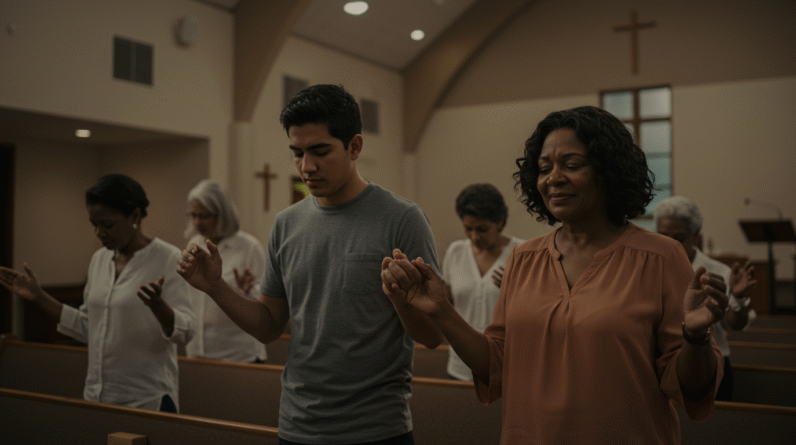What Does It Mean That The Church Is The Body Of Christ?
You’ve probably heard the phrase “the Church is the Body of Christ” a hundred times. It shows up in sermons, songs, and Christian conversations as a shorthand for something deep and powerful. But what does that phrase actually mean? When you explore the Body of Christ’s meaning, you discover a biblical picture of spiritual life that shapes how you relate to God, to other believers, and to the world. This article walks you through the Bible’s teaching on the Church as the Body of Christ, explains the practical implications for your life, and points you to key Scriptures so you can see the foundation for yourself.
The Basic Picture: Body of Christ meaning in a Sentence
At its simplest, the Body of Christ’s meaning is that the Church is not merely an organization, building, or club — it is a living, interconnected spiritual organism with Christ as its head. The New Testament uses the metaphor of a body to show that believers are joined together in Christ, share different gifts and functions, and depend on one another to be healthy and effective. This image moves you from thinking of faith as a private matter to seeing it as an embodied, communal reality.
The Scriptural Foundations for the Body of Christ, meaning
The New Testament develops the Body of Christ’s meaning in several complementary ways. Paul is the primary New Testament writer who uses body language to describe the Church. When you read his letters, you find repeated emphasis on unity, diversity, mutual dependence, and Christ’s headship.
- Start with Paul’s extended teaching on spiritual gifts and the Church’s unity in 1 Corinthians, where he uses the body metaphor at length: 1 Corinthians 12:12-27.
- He repeats the theme of unity and diversity in Romans when he explains that believers form one body with different members: Romans 12:4-5.
- Paul also connects the Church’s identity to Christ’s authority and presence in Ephesians and Colossians: Ephesians 1:22-23 and Colossians 1:18.
- The idea of being joined and nourished by Christ like a vine and branches reinforces how dependent the Church is on Him: John 15:5.
Each of these passages helps you see a different facet of the Body of Christ’s meaning. Together, they form a rich biblical theology of corporate life in Christ.
Paul’s Teaching in 1 Corinthians 12: the anatomy of church life
When you read 1 Corinthians 12:12-27, Paul’s argument is strikingly practical and relational. He uses the human body to show that diversity among believers is normal, necessary, and designed by God. Different members have different roles — some are eyes, some are hands, some are feet — but none can claim independence without weakening the whole. The passage underscores mutual care: when one part hurts, the whole body suffers; when one part thrives, the whole rejoices.
That relational focus matters for you because it reframes how you view other Christians. You’re not in competition for spiritual leadership or recognition; you’re in cooperation for mutual growth. The Body of Christ, meaning here, is a call to humility, service, and sensitivity to the needs of others.
Romans 12: unity and diversity in practical Christian living
In Romans 12:4-5, Paul again compares Christians to a body, emphasizing that each believer belongs to Christ and to one another. The same chapter (Romans 12:6-8) goes on to describe how your gifts function within the body: prophecy, service, teaching, encouragement, giving, leadership, and mercy — each played out for the benefit of the whole (Romans 12:6-8).
Put simply, the Body of Christ’s meaning includes a strong vocational element: you have a role to play. That role isn’t optional if you belong to the body. You contribute, and when you do, the entire Church gets healthier and more missional.
Ephesians: Christ as head, the Church as organs of His life
Ephesians brings together the personal and corporate dimensions of salvation, showing how Christ is head over everything and the Church is his body. Read Ephesians 1:22-23 and Ephesians 2:19-22 and you’ll see that the Church is described as Christ’s body because he fills and unites it. He is not merely its source but its governing and life-giving presence.
For your life, that means the Church’s identity is ultimately found in Christ, not in programs, structures, or human leaders. The Body of Christ, meaning here, is ontological — it speaks to what the Church is in reality, not merely what it does.
Colossians and the centrality of Christ
Colossians sharpens the point: Christ is the head of the body, the Church, and he is the beginning and the firstborn from among the dead (Colossians 1:18). That Christ-centeredness shapes every aspect of church life — doctrine, worship, mission, and fellowship. When you think about the Body of Christ’s meaning, remember that the Church’s life is rooted in Christ’s supremacy and resurrection power.
Unity and diversity: how that plays out in the congregation
Understanding the Body of Christ’s meaning helps you navigate the tension between unity and diversity. The Bible doesn’t call you to uniformity; it calls you to unity in Christ that respects differences while aligning hearts and actions to a common mission.
When Paul explains that “the body is not made up of one part but of many” (1 Corinthians 12:14), he’s advocating for an interdependent community where variety is valued. You might feel tempted to compare your gift to someone else’s, but the body image counters that by affirming that every contribution matters and every member is indispensable.
This perspective changes conflict management, leadership expectations, and how you evaluate your worth. You measure success not by individual applause but by the flourishing of the whole.
Spiritual gifts and roles: your contribution to the Body of Christ, meaning
Gifts are central to the Body of Christ’s meaning because they are the mechanisms through which the body functions. God gives gifts to you and other believers so the Church can minister effectively in the world. Paul’s list in Romans and his extended treatment in 1 Corinthians show that gifts are diverse and intended for mutual edification.
- You receive gifts to serve, build up, and strengthen others (1 Peter 4:10; Romans 12:6-8).
- The Church’s health rises and falls with the faithful use of those gifts, not merely with spectacular displays or charismatic personalities.
Your gifts may be quiet (hospitality, encouragement, mercy) or public (teaching, leadership). Either way, the Body of Christ’s meaning demands that you steward whatever God has given you for others’ benefit. When you minimize or hoard your gift, the body misses a needed function.
How gifts fit into daily church life
In everyday terms, gifts look like people showing up, helping, teaching, praying, encouraging, and organizing. When you volunteer for a Sunday school class, lead a small group, bake for someone in need, or show hospitality to a newcomer, you’re living out the Body of Christ in practical, tangible ways. The Church’s mission is carried forward in ordinary acts of service, not just in big public events.

Belonging to a spiritual family: identity and mutual care
The Church as the Body of Christ also has a strong familial dimension. In the New Testament, believers are described as brothers and sisters, part of God’s household, and citizens in God’s kingdom. Paul calls the Church a household that’s being built together on Christ as the cornerstone (Ephesians 2:19-22). The early church’s life in Acts shows how this family identity expressed itself in shared life, teaching, prayer, and common meals (Acts 2:42-47).
For you, belonging means more than attendance. It includes commitment, accountability, and mutual support. You grow in faith most effectively inside these relational networks where people speak truth in love, share burdens, and celebrate progress. The Body of Christ’s meaning implies that Christian maturity is communal — you don’t become like Christ in isolation.
The Church as a living organism, not a machine
One helpful way to understand the Body of Christ’s meaning is to think of a living organism rather than a machine. A machine functions because its parts are assembled and operate according to design. An organism, by contrast, grows, heals, adapts, and learns. Scripture uses “body” language to emphasize that the Church is alive — it grows, it responds to injury, and it bears fruit as a whole when connected to the head, Christ.
Jesus’s metaphor of the vine and the branches captures this dependency well: “I am the vine; you are the branches. If you remain in me and I in you, you will bear much fruit…” (John 15:5). The vine metaphor complements the body metaphor: both highlight connection, nourishment, and dependence on Christ. The Body of Christ meaning therefore, includes both the corporate nature of the church and its spiritual vitality.
Health, growth, and healing in the body
When one member is sick, the body’s response is care and healing. Paul’s imagery calls you to watch for spiritual and emotional needs in others and to respond with prayer, encouragement, and practical help. Ephesians teaches that the body grows when every part does its work: “From him the whole body, joined and held together by every supporting ligament, grows and builds itself up in love…” (Ephesians 4:15-16). The Body of Christ’s meaning involves intentional growth — discipleship, teaching, and acts of love that result in maturity.
Practical implications: what the Body of Christ means for you
Understanding the Body of Christ’s meaning should change how you live, relate, serve, and witness. Here are practical ways that insight plays out in daily life.
- You’re called to belong. Don’t treat church as a buffet of services; commit to a local congregation where you can invest and be invested in. Hebrews frames this as exhortation: “Let us consider how we may spur one another on toward love and good deeds, not giving up meeting together…” (Hebrews 10:24-25).
- You’re called to serve. Identify and use your gifts for the benefit of others. Paul expects active participation, not passive consumption (Romans 12:6-8).
- You’re called to unity. Work for reconciliation and peace, recognizing that unity doesn’t mean sameness but communion in Christ (1 Corinthians 12:25-26).
- You’re called to a mission. The Church as the Body of Christ means being sent into the world to make disciples. Christ’s commission to his followers remains central: “Therefore go and make disciples of all nations…” (Matthew 28:18-20).
These are not optional niceties; they are how the body functions. When you ignore them, the body suffers. When you embrace them, the body flourishes.
How to live out the Body of Christ in everyday scenarios
Living out this meaning looks different in your family, workplace, small group, and congregation. Here are tangible practices you can adopt.
- Show up consistently. Regular presence in worship and small groups builds trust and creates opportunities for mutual ministry. The early church modeled this by devoting itself to the apostles’ teaching and fellowship (Acts 2:42).
- Serve with humility. Don’t wait for an invitation; ask leaders where you can help. Use your gifts for others (1 Peter 4:10).
- Practice reconciliation. When conflicts arise, pursue peace quickly and publicly if necessary, remembering the body suffers amid division (Ephesians 4:3).
- Encourage growth. Invest in someone’s spiritual life through discipleship or mentoring, contributing to the body’s maturity (Ephesians 4:15-16).
- Engage missionally. Let your neighborhood, workplace, and relationships benefit from the gospel-shaped life of the body (Matthew 5:14-16).
These habits help you embody the Body of Christ in ways that produce spiritual health and witness.
Common misunderstandings about the Body of Christ’s meaning
Because the concept is rich, some misunderstandings pop up that can distort the biblical picture.
- Thinking the body is only the institutional church. The Bible’s image is broader: the body includes all believers united to Christ, not merely a denomination or building. Ephesians identifies the body as the assembly of all committed believers with Christ as head (Ephesians 1:22-23).
- Confusing unity with uniformity. Unity in Christ accommodates diversity of background, culture, and gift. Paul explicitly addresses this and calls for mutual respect within the shared life of the body (1 Corinthians 12:12-27).
- Minimizing the need for accountability. Some treat faith as purely individual; the biblical body always includes correction, discipline, and accountability as parts of spiritual health (see Matthew 18:15-17, though the primary body imagery comes from Paul). The Body of Christ’s meaning involves both care and correction.
If you recognize any of these distortions in your own thinking, the biblical images invite you to reorient toward the fuller scriptural vision.
The Body of Christ: meaning and leadership
Leadership in the body has a particular character. Since the Church is Christ’s body, leaders are not mere CEOs; they are servants who equip the saints, shepherd the flock, and point people to Christ. Ephesians describes the role of church leaders as equippers: “So Christ himself gave the apostles, the prophets, the evangelists, the pastors and teachers, to equip his people for works of service…” (Ephesians 4:11-12).
Your expectations of leaders should reflect the Body of Christ, meaning: leaders lead by serving, encourage gifts in others, and build structures that foster mutual ministry rather than dependence on personality.
The Body of Christ: meaning and mission: why the world needs a healthy body
When the Church lives out its identity as the Body of Christ, it becomes a persuasive witness to the world. The early church’s communal life — generosity, care for the vulnerable, and bold witness — drew people to faith in Christ (Acts 2:42-47). Jesus prayed that the unity of his followers would be a testimony to the world (John 17:21), showing that the Body of Christ’s meaning is not merely introspective but deeply missional.
If you want your community to make an impact, encourage practices that reflect the body’s life: hospitality, care for the marginalized, faithful proclamation, and sacrificial service. When the Church acts like a loving, connected body, the Gospel’s credibility increases.
The eschatological dimension: the Body of Christ and the future
The Body of Christ, meaning also looks forward. Paul envisions the Church growing into the fullness of Christ until we all reach maturity (Ephesians 4:13). Colossians calls Christ the head “from whom the whole body… grows with a growth that is from God” (Colossians 2:19). That future-oriented aspect means your participation matters not only for present health but for the consummation of Christ’s kingdom. The Body of Christ, the meaning thus connects your daily faithfulness with God’s ultimate redemption plan.
Questions to help you reflect on your place in the body
You can use the following questions as prompts to evaluate how you live out the Body of Christ:
- Where are you invested in a local congregation or small group?
- What spiritual gifts have you been using, and which ones need cultivation?
- How do you respond when another member is struggling? Do you reach out and offer practical help?
- When conflict arises, are you quick to seek reconciliation or quick to withdraw?
- In what ways does your local church reflect Christ as its head in teaching and practice?
Reflecting on questions like these helps you move from theological understanding to faithful practice in your daily life.
Stories and examples: how the body metaphors play out
You’ve likely seen the Body of Christ meaning lived out in small, ordinary stories: a church that mobilizes to help a family after a crisis, members who commit to regular visitation of elderly neighbors, or a community that welcomes refugees and integrates them into its life. Those examples illustrate the metaphor in action — the body responding, caring, and carrying out its mission.
Think about your own context. When you choose to serve, encourage, or invite someone into community, you’re participating in the ancient, biblical reality that the Church is Christ’s body. These acts, multiplied across many believers, produce a rhythm of life that changes neighborhoods and cities.
Conclusion: Embracing your role in the Body of Christ means
Understanding the Body of Christ’s meaning helps you see that the Christian life is inherently communal, gifted, and Christ-centered. You’re not called to be an isolated believer or a consumer of spiritual goods. You’re called to belong, to serve, to grow, and to witness alongside others — all under the headship of Jesus Christ.
So take this image seriously. Find a local body where you can invest. Discover and deploy your gifts. Build relationships that foster spiritual growth and mutual care. When you do, you’ll experience the Church not merely as an institution but as a living, growing organism — the Body of Christ — bringing life to the world.
Explore More
For further reading and encouragement, check out these posts:
👉 7 Bible Verses About Faith in Hard Times
👉 Job’s Faith: What We Can Learn From His Trials
👉 How To Trust God When Everything Falls Apart
👉 Why God Allows Suffering – A Biblical Perspective
👉 Faith Over Fear: How To Stand Strong In Uncertain Seasons
👉 How To Encourage Someone Struggling With Their Faith
👉 5 Prayers for Strength When You’re Feeling Weak

📘 Jesus and the Woman Caught in Adultery – Grace and Mercy Over Judgement
A powerful retelling of John 8:1-11. This book brings to life the depth of forgiveness, mercy, and God’s unwavering love.
👉 Check it now on Amazon
🌍 “Every great message deserves a home online.”
Don’t let your calling stay hidden. Start a Christian Blog/Website using Hostinger — with 99.9% uptime, free domain, and SSL, your voice can shine for God’s glory anytime, anywhere.
👉 Begin today. Try it RISK-FREE!
“Your body is God’s temple — care for it with purpose.”
Renew your energy and restore balance the natural way. Mitolyn helps support a healthy metabolism, giving you the vitality to live out God’s calling with strength and confidence.
🌿 Unlock Your Metabolic Power. Burn More Calories & Feel Great With Mitolyn.
👉 Start Today. Check Price Now.
As a ClickBank & Amazon Affiliate, I earn from qualifying purchases.
Acknowledgment: All Bible verses referenced in this article were accessed via Bible Gateway (or Bible Hub).
“Want to explore more? Check out our latest post on Why Jesus? and discover the life-changing truth of the Gospel!”






